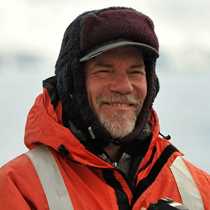At Sea
When the going gets tough, the tough are probably in Antarctica. The seventh continent is a challenging place. History here is rife with harrowing tales of hardship, incredible good luck, terrible tragedy and narrow squeaks to survival. Even today, aboard modern expedition ships with many comforts and amenities, visiting this frozen wilderness is a difficult business. Skilled ice masters guide our course with constant vigilance; expedition leaders and Zodiac drivers must always be ready for sudden changes in winds and weather. Fleece, neoprene and breathable waterproofs keep us warm and dry, for a little while. Even after a couple of hours there is palpable relief in returning to the warmth and security of our vessel.
Antarctica has been frozen for twenty-five million years. All that time, nearly half the length of the Age of Mammals, the continent has been locked in ice, the seas isolated and terribly cold. As this gauntlet of severe climate was thrown down, life took up the challenge and while some species died, others thrived in wonderful ways and became rulers of a new domain. One amazing case is the family of fish known as the Notothenidae, the Antarctic cod. Long ago, as the seas began to freeze, the ancestor of these fish co-opted an old unused gene to produce a very unusual protein that acted as an anti-freeze in its blood. Armed with this incredible adaptation, its descendents have radiated to occupy many different niches and come to dominate the Southern Ocean. In evolution necessity is indeed the mother of invention, and, as in human affairs, the most difficult challenges point the way to the greatest rewards.
So it is with travel to wild places. There are rough crossings, bitter winds and a host of other difficulties, major and minor. But the recompense, to stand on these rocky shores and look out over the ice, to know this ancient, beautiful and unique place with mind and heart, is worth so much more.
When the going gets tough, the tough are probably in Antarctica. The seventh continent is a challenging place. History here is rife with harrowing tales of hardship, incredible good luck, terrible tragedy and narrow squeaks to survival. Even today, aboard modern expedition ships with many comforts and amenities, visiting this frozen wilderness is a difficult business. Skilled ice masters guide our course with constant vigilance; expedition leaders and Zodiac drivers must always be ready for sudden changes in winds and weather. Fleece, neoprene and breathable waterproofs keep us warm and dry, for a little while. Even after a couple of hours there is palpable relief in returning to the warmth and security of our vessel.
Antarctica has been frozen for twenty-five million years. All that time, nearly half the length of the Age of Mammals, the continent has been locked in ice, the seas isolated and terribly cold. As this gauntlet of severe climate was thrown down, life took up the challenge and while some species died, others thrived in wonderful ways and became rulers of a new domain. One amazing case is the family of fish known as the Notothenidae, the Antarctic cod. Long ago, as the seas began to freeze, the ancestor of these fish co-opted an old unused gene to produce a very unusual protein that acted as an anti-freeze in its blood. Armed with this incredible adaptation, its descendents have radiated to occupy many different niches and come to dominate the Southern Ocean. In evolution necessity is indeed the mother of invention, and, as in human affairs, the most difficult challenges point the way to the greatest rewards.
So it is with travel to wild places. There are rough crossings, bitter winds and a host of other difficulties, major and minor. But the recompense, to stand on these rocky shores and look out over the ice, to know this ancient, beautiful and unique place with mind and heart, is worth so much more.



